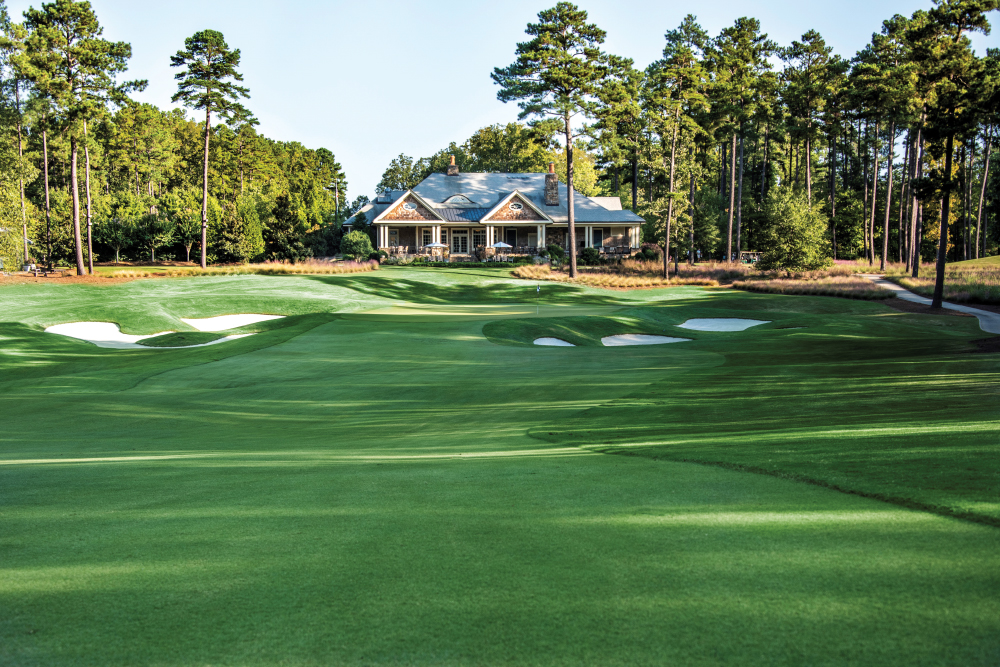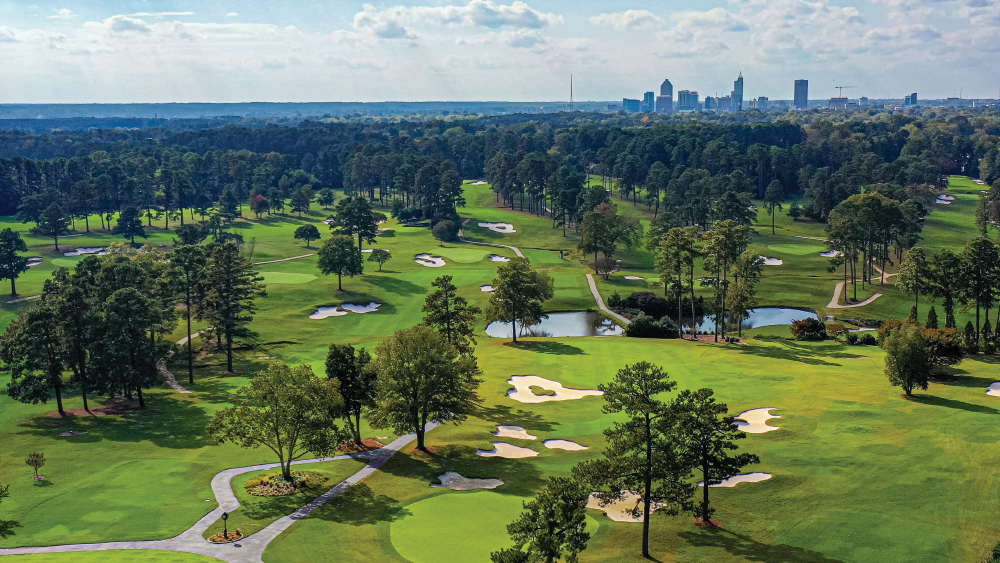A look at the history of Raleigh’s varied golf courses, which are thriving despite the pandemic
by Lee Pace
One Friday during the summer of 1998, three Chapel Hill businessmen decided to knock off early and go for lunch and golf at their club. Problem was, the tee sheet was full.
“Why don’t we build our own golf course?” was the collective idea from Paul Rizzo, Bob Eubanks, and Rex Teaney, all three of them at the time high on the mast at Franklin Street Partners, a Chapel Hill financial management firm. At the height of two decades of a strong domestic economy and rapid growth of golf’s popularity, other golf venues across the Triangle were inundated as well.
The result, three years later, was Old Chatham Golf Club, on a wooded tract in the heart of the Research Triangle, easily accessible from Raleigh, Durham, and Chapel Hill. It was designed by Rees Jones, one of the most prolific golf course architects in America.
“I’d been a member at Carolina Country Club in Raleigh since I was a kid,
but it was hard to get a tee time there,” says Smedes York, Raleigh’s mayor from 1979 to 1983, who joined Old Chatham to have the option of playing at a less crowded club. “It was not a case of ‘either/or.’ It was a case of ‘adding to.’ There was a need for a new club, one centrally located within the Triangle.
“The club provided a coming together of people throughout the Triangle, a place to drop territorial rivalries at this one place,” adds Roger Perry, president of East West Partners and another early Old Chatham board member.
“This year, we hit our membership cap,” says Allen Wilson, who assumed the club leadership in 2012. “I think the guys with the original vision would be pleased. Old Chatham has evolved into a sanctuary for people who love a pure golf environment.”
Golf is thriving today in the Raleigh area at every level, from the elite private club to the daily-fee course. Amid a pandemic, being outside and keeping six feet of personal space works well on a 400- yard golf hole. After losing a month or two of rounds beginning in March 2020 when the pandemic hit, industry professionals implemented safety protocols and reopened courses. Golf became a bubble for fresh air, sunshine, and exercise.
Golf rounds nationwide at private clubs were up 19.9% in 2020, while public facilities saw a 12.4% rise, according to the National Golf Foundation. Raleigh Golf Association, one of the area’s oldest golf venues, confirms that the sport is thriving here in the Triangle.
A.E. Finley was one of the leaders of the Raleigh business community in the mid-20th century, when his construction equipment company was thought to be the largest in the nation. Finley loved golf and was a member at Carolina Country Club, the city’s oldest course (originally founded in 1910 as Raleigh Country Club; the name changed in 1918), but he thought Raleigh should also have an inexpensive course where middle-class and blue-collar workers could play for a modest cost. As one of 11 kids who grew up in rural Virginia, he saw the benefit of making the sport more widely accessible.

Thus the Raleigh Golf Association course was founded in 1929 off Tryon Road, 3 miles southwest of downtown Raleigh, with Finley contributing a portion of the cost and selling shares of stock to raise additional capital. Nine holes were added in the 1950s by architect George Cobb, and today, nearly 100 years later, the 27-hole facility is Raleigh’s second-oldest course, with weekday green fees for walkers from $25 — and a course that’s equally popular among men, women, seniors, and junior golfers.
Finley’s name now sits atop a plaque on the clubhouse wall that lists the founding officers and board members (just as it is at later philanthropic efforts, the Carter-Finley Stadium at North Carolina State University and Finley Golf Course at the University of North Carolina).
There’s a photo on the golf shop wall of Sam Snead and Gene Sarazen playing an exhibition there in 1937. Arnold Palmer played at RGA in the 1950s when he was on the golf team at nearby Wake Forest College. Noted amateur Clarence Alexander grew up at RGA as a caddie and later came back to win five Raleigh City Championships from 1950-60.
Today RGA is leased and managed by McConnell Golf, a Raleigh-based golf ownership and management firm founded by John McConnell. It has grown since 2003 into owning 14 clubs and managing two others across a swath that runs from the South Carolina coast to Tennessee.
“I started thinking about it and wondered if RGA is a place we can expand our footprint and do something to grow the game,” says McConnell, about making the lease arrangement in 2016. “I have fond memories of playing RGA years ago. I always liked it and it had a great stretch of finishing holes. It was a pleasure to play. Raleigh’s a great market and I think this is a course we can use to attract more people to the game.”
Across McConnell Golf’s portfolio, which includes over a dozen properties in North Carolina and its neighbor states, rounds were up 25% this past year.
“We were very fortunate to be on the good side of the pandemic,” says Brian Kittler, McConnell’s vice president for golf operations. “So many people in hotels, restaurants, and small businesses were affected. A lot of gyms were closed, parks were closed, areas where people could walk and ride bikes were closed. Golf courses became a safe haven.”
Five miles across town on the eastern edge of the city, Raleigh Country Club was closed from March through November 2020 for a renovation project. Designed by Donald Ross in 1948, McConnell Golf bought this course in 2003 when the club was considering shutting down and selling its land to commercial developers. Golf course architect Kyle Franz supervised the $5.5 million project, which included rebuilding greens, tees, and bunkers and installing a new irrigation system. Franz also culled the property of approximately 500 trees to help turf quality by allowing more sunlight and airflow, but also to open up long-range vistas across the course.
Today, McConnell can stand on the clubhouse veranda, the highest point on
the property, and see up to a dozen holes.
From this perch just off New Bern Avenue, east of downtown out toward Old Chatham and beyond, the view’s pretty sweet indeed. As a year in the clutches of COVID-19 has proved, there’s nothing quite the equal of fresh air, companionship, good exercise, and the challenge of maneuvering a golf ball from point A to point B.
Lee Pace’s new book, Good Walks—Rediscovering the Soul of Golf at Eighteen of the Carolinas’ Best Courses, is available this month. He lives in Chapel Hill.




